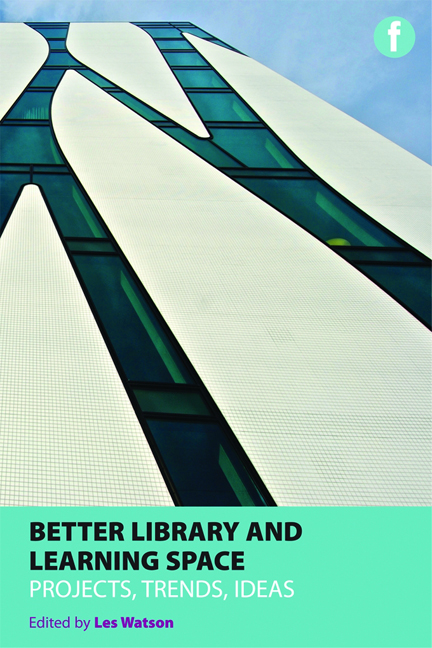Book contents
- Frontmatter
- Contents
- Case studies
- Acknowledgements
- Contributors
- Introduction – about this book
- PART 1 PROJECTS AND TRENDS
- PART 2 TRENDS AND IDEAS
- PART 3 IDEAS AND FUTURES
- Introduction
- 11 Beyond space: access is all – or is it?
- 12 Thinking inside the box
- 13 Nothing has changed/everything has changed – the enduring aspects of learning
- 14 Books, nooks and MOOCs
- 15 The researcher's view: context is critical
- 16 Libraries in the network society: evolution, revolution, extinction?
- 17 Powered by learning: developing models of provision to meet the expectations of new generations of students
- 18 The library has left the building
- 19 Beyond analogue: the learning studio as media-age library
- 20 3D libraries for 3D smarting
- 21 Learning landscapes, the library and the University of Lincoln: efficiency, effectiveness, expression and experimentation
- 22 Viral design: learners building better environments together
- 23 The interior designer's view
- 24 Furniture fit for the future – a brief exploration of library and learning furniture today and for the coming generation
- 25 Conclusions
- Index
19 - Beyond analogue: the learning studio as media-age library
from PART 3 - IDEAS AND FUTURES
Published online by Cambridge University Press: 08 June 2018
- Frontmatter
- Contents
- Case studies
- Acknowledgements
- Contributors
- Introduction – about this book
- PART 1 PROJECTS AND TRENDS
- PART 2 TRENDS AND IDEAS
- PART 3 IDEAS AND FUTURES
- Introduction
- 11 Beyond space: access is all – or is it?
- 12 Thinking inside the box
- 13 Nothing has changed/everything has changed – the enduring aspects of learning
- 14 Books, nooks and MOOCs
- 15 The researcher's view: context is critical
- 16 Libraries in the network society: evolution, revolution, extinction?
- 17 Powered by learning: developing models of provision to meet the expectations of new generations of students
- 18 The library has left the building
- 19 Beyond analogue: the learning studio as media-age library
- 20 3D libraries for 3D smarting
- 21 Learning landscapes, the library and the University of Lincoln: efficiency, effectiveness, expression and experimentation
- 22 Viral design: learners building better environments together
- 23 The interior designer's view
- 24 Furniture fit for the future – a brief exploration of library and learning furniture today and for the coming generation
- 25 Conclusions
- Index
Summary
Introduction
In Cognitive Surplus, Clay Shirky (2011) signals a fundamental transition of our post-television age. He argues that media has become ‘the connective tissue of society’. No longer ‘something produced by professionals for consumption by amateurs’, the power of digital media is in moving culture beyond the one-way transmission of broadcasting to a two-way interaction where new ideas and ways of thinking emerge. The challenge for educators in the 21st century is in capturing this active role for our students and classrooms: ‘We have to rethink the basic concept of media: it's not just something we consume, it's something we use.’
This challenge is nowhere more evident than in library spaces. Mobile devices have created new ways of connecting and learning from others through images, audio and video; our students come to us expecting to interact and collaborate in vital communities linked by new media messages. Though significant attention has been given to the transition from print to digital collections, the 21st-century library must attend to the participatory culture sparked by digital media and modes of thinking and working together.
In 2010 the Brown Library at Abilene Christian University (ACU) opened the AT&T (American Telephone & Telegraph) Learning Studio. In the last decade, library redesigns built around the information commons model attempted to move spaces beyond the analogue assumptions of the repository – curation and consumption – and connect the library to the world of the web, creating a kind of crossroads for information gathering of all sorts. The studio model takes an essential next step, seeing library spaces as sites of not only information literacy and analysis but also production, collaboration and a growing list of practices essential to learning in the 21st century.
Towards media fluency
One early voice in reframing education for the 21st century was the Partnership for 21st Century Skills (P21) project. In 2002 the US Department of Education founded this project with advocacy groups like the National Education Association and corporate support including Apple, Microsoft and Time Warner. The P21 project asked what core skills would need to complement knowledge in core subjects to allow students ‘to succeed as citizens and workers in the 21st century’ (Partnership for 21st Century Skills, 2002).
- Type
- Chapter
- Information
- Better Library and Learning SpaceProjects, trends and ideas, pp. 215 - 222Publisher: FacetPrint publication year: 2013



